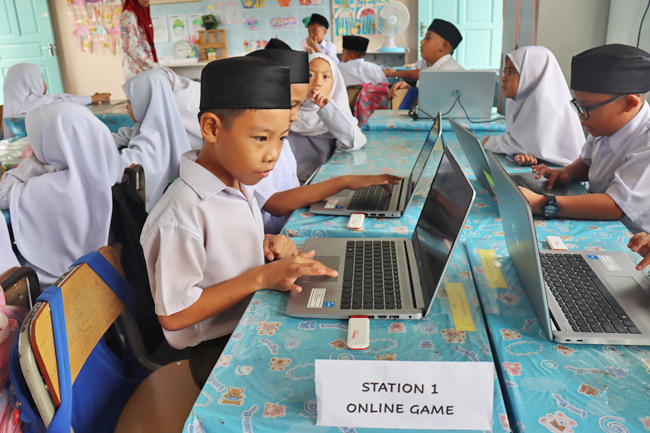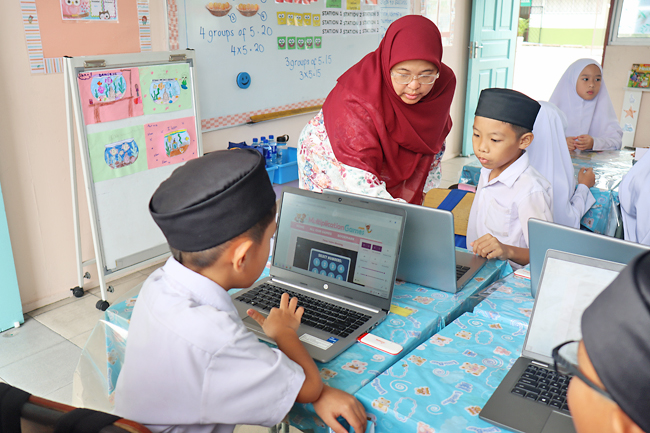Brought to you by

This year’s National Teacher’s Day celebration highlights educators across the country, recognising their pivotal role in shaping and transforming the nation’s education system.
The sub-theme for this year – ‘Education for a Continuously Changing World’ – is particularly fitting, as the Ministry of Education (MoE) works to equip teachers with the 21st-Century skills required to navigate and integrate technology into classrooms, fostering a future-ready generation.
EMBRACING 21ST-CENTURY SKILLS: EDTECH CENTRE
The Educational Technology Centre (EdTech), established in 2019 under the MoE, plays a vital role in incorporating digital technology into the national education system.
“The integration of ICT began in the 1990s with the introduction of Computer Studies in the curriculum and the setup of computer laboratories in schools,” the centre shared, adding that its establishment signals the country’s renewed commitment to staying in step with a rapidly changing world.
By drawing on best practices and trends from leading nations in educational technology, the centre ensures that both teachers and students have access to a wide array of innovative teaching and learning resources.
Among the technologies introduced are platforms like MOE TV and the Digital Resource Management System (DRMS), offering educators a vast selection of high-quality content to enhance learning.
Keeping up with current trends, the centre is also exploring the use of generative artificial intelligence to streamline content development, they shared.


“These technologies allow us to produce resources more efficiently, enabling the creation of innovative tools such as augmented reality (AR) flashcards and other dynamic content.”
Additionally, through the phased implementation of the Smart Classroom project, the EdTech Centre equips schools with smart devices, further enhancing teaching and learning for both teachers and students.
The centre shared that ongoing teacher training is being provided to adopt innovative approaches, ensuring their teaching remains dynamic and effective in improving student learning outcomes.
“Through the joint efforts of various MoE stakeholders, it is hoped that all these initiatives and investments will support the digital transformation of education, equipping learners with the knowledge and 21st-Century skills needed to become future-ready citizens.”
EVOLVING NEEDS IN EDUCATION: THE BRUNEI DARUSSALAM LEADERSHIP AND TEACHER ACADEMY (BDLTA)
With teachers leading the charge in education transformation, it is essential that those across Brunei receive the proper training and opportunities for professional development.
This ensures they remain equipped to adapt to new teaching methods, technologies, and educational challenges.
Supporting teachers in their growth is key to maintaining the momentum of progress in Brunei’s education system, ensuring both educators and learners are well-prepared for the challenges ahead.
In recent years, the Brunei Darussalam Leadership and Teacher Academy (BDLTA) has recognised the evolving demands in education, particularly the growing need for innovative teaching methodologies and effective leadership development.
In response, the academy has introduced cutting-edge programmes, such as the Digital Learning and Technology Modular Series, which empower educators to utilise digital tools effectively in their classrooms.
“These programmes are not one-size-fits-all but are tailored to the unique challenges educators face in their respective roles, ensuring relevance and practical application,” shared the Head of Unit at the BDLTA Dr Roslena binti Pehin Datu Indera Sugara Dato Seri Laila Jasa Haji Johari.
One of the most notable impacts of the BDLTA is its ‘Signature Series Tier Programme’ for teachers and school leaders.
These programmes, explained Dr Roslena provide practical methodologies that enhance pedagogical practices, cultivate a learning culture, and offer targeted support for specialist teachers.
Curated according to the Brunei Darussalam School Leadership Standards and Competency Framework, the programmes train educators in learning theories and allow them to apply these insights through hands-on action research projects, leading to tangible improvements in teaching. Additionally, BDLTA’s coaching initiatives, such as the TGROW framework, have transformed the professional journeys of many educators, refining peer-to-peer mentoring skills and fostering a culture of continuous improvement.
To ensure sustainable and impactful professional development, the BDLTA employs key strategies prioritising ongoing support over isolated training sessions.
The academy also harnesses technology to create accessible and scalable development opportunities.
With platforms like the Virtual Learning Environment and Online Registration and Evaluation systems, teachers and school leaders can access resources and support long after their initial training.
“This digital approach extends the reach and longevity of BDLTA’s programmes ensuring that educators continue to grow professionally in a sustainable manner,” continued Dr Roslena.
Beyond training, every year, BDLTA fosters professional dialogue through various events, including Special EduTalks, Teacher’s Day Conferences, School Leaders Conventions, and Educators Specialist Seminars.
“These gatherings offer educators the chance to share best practices, network with peers, and engage with thought leaders in education.
“The BDLTA has consistently evolved to meet the changing needs of Brunei’s educators, providing them with support, opportunities and strategies needed to enhance their skills and effectiveness in the classroom and the school as a whole.”





